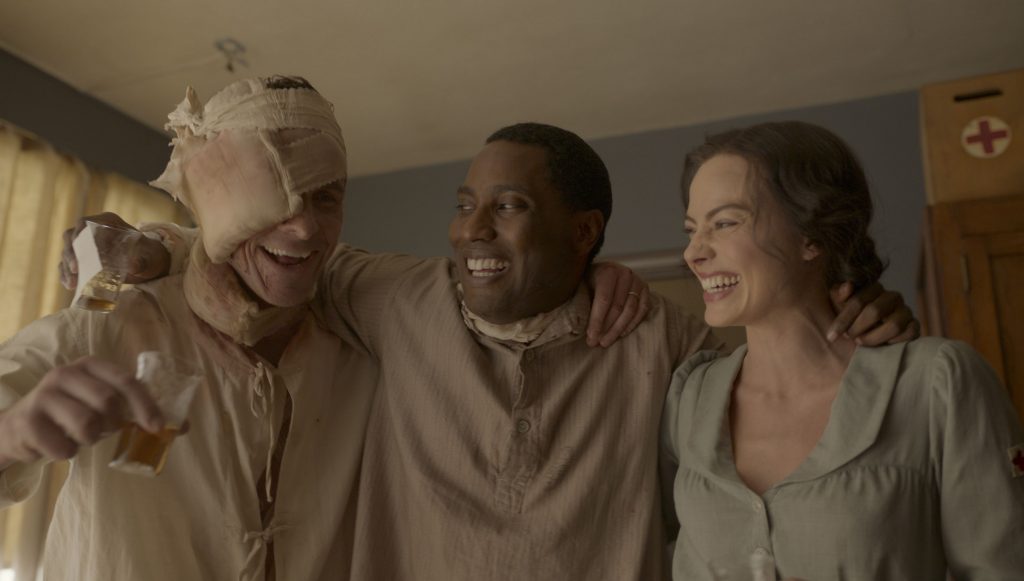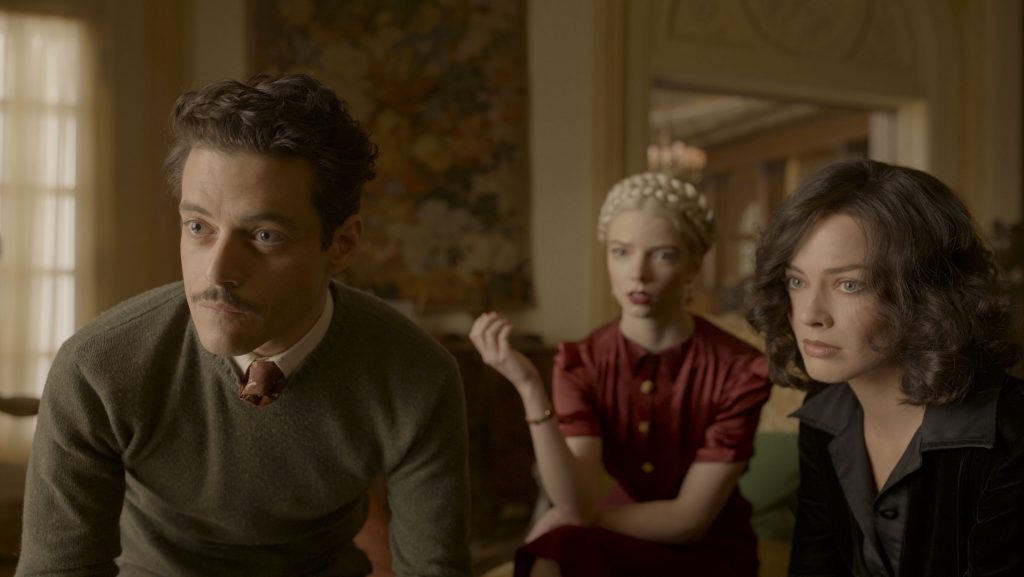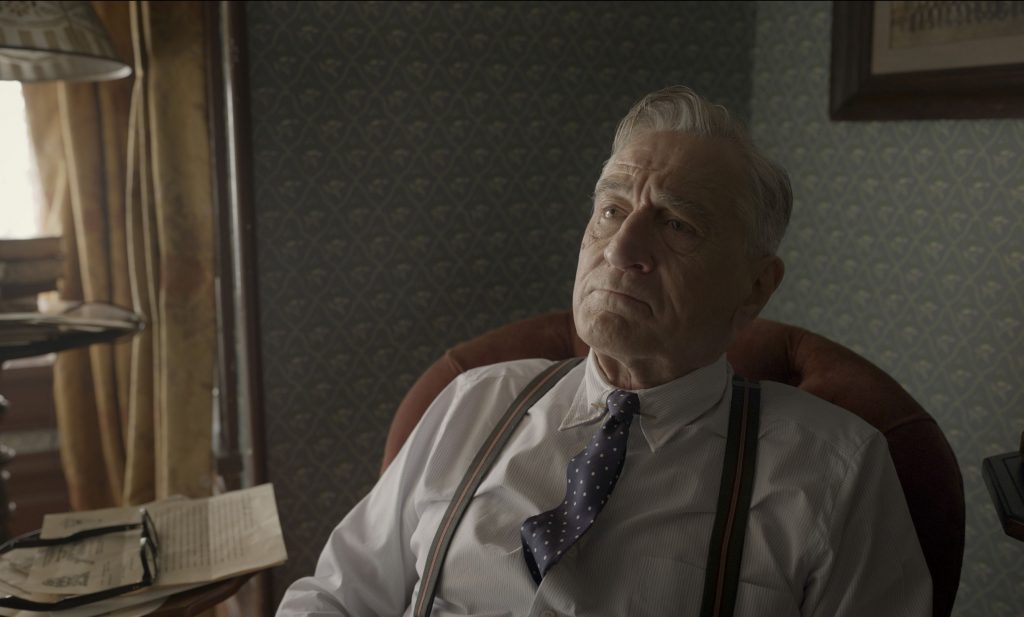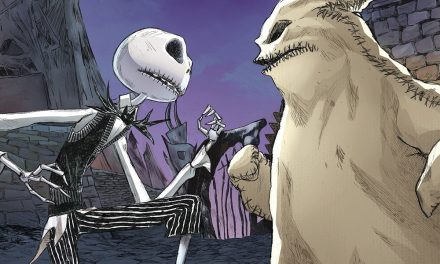In David O. Russell’s Amsterdam, three friends – played by Christian Bale, Margot Robbie, and John David Washington – witness a murder, become suspects themselves, and uncover one of the most outrageous plots in American history.
Set in the ‘30s, the ensemble cast also features Andrea Riseborough, Chris Rock, Rami Malek, Anya Taylor-Joy, Michael Shannon, Zoe Saldana, Mike Myers, Timothy Olyphant, and Robert De Niro.
An exceptional trio in Bale, Robbie, & Washington
The best thing about Amsterdam by far is its cast. Christian Bale, Margot Robbie, and John David Washington shine as the leading trio; their friendship is fun, sweet, and most of all, believable. Also, the movie gets major props from me for not doing an annoying love triangle/any kind of romantic jealousy between the leads. I expected the movie to go there, and I was pleasantly surprised when it didn’t.
That said, the trio aren’t fully equal co-leads. Washington is simply given less to work with; while Burt and Valerie each get backstories that become relevant to the current plot, Harold just kind of exists. I wish the movie did more to round out his character.

As for the ensemble, it’s hard to go wrong with a Rami Malek – Anya Taylor-Joy team-up. Really, it’s clear all of the actors are putting in the work for these characters, even though the screen time for many of them doesn’t amount to much. Amsterdam doesn’t have a lot going for it – plot-wise or stylistically – but the acting does hit the caliber you expect from these big names.
A unique but polarizing style
Here’s where things start to decline.
Writer/director Russell takes a very specific, stylized approach to Amsterdam that will prove hit-or-miss with viewers. Characters have a manner of speaking by which they repeat their statement multiple times in a slightly different way. When used during an important emotional moment, delivered by one of the very talented leads, this can add a unique flair and flavor to scenes.
But when used to repeat plot information from a character who only appears briefly, it creates the flat, vaguely annoying atmosphere of an unskippable video game cutscene. (The characters are only programmed to deliver one bit of information, you see. If you keep trying to interact with them, they have to simply deliver their one bit over and over again.)
One of the most egregious examples of this happens in one of the film’s first scenes (“the man in the box”). That creates an especially jarring start, since we as the viewer haven’t had time to adjust to this manner of speaking yet, and we’re suddenly thrust into the worst example of it.
Ultimately, the specific dialogue patterns might make-or-break the film for a viewer; they’re pretty consistent throughout the film, so if you find the repetition insufferable, you’re going to struggle to make it through this one.

A surprising lack of stakes and tension
The description for Amsterdam outlines a plot prime for tension, thrills, and even laughs: a trio falsely accused of murder, who in attempting to clear their names, end up uncovering a greater conspiracy.
Somehow, Amsterdam manages to make this setup feel dull.
It’s strange, because I did care about these characters. By proxy, this means I should care about what happens to them. But Amsterdam seems to undercut its own interesting setup, minimizing its biggest tensions to the point of erasure.
Not a whodunnit…
Let’s start with the murder, since that begins this story. First, Amsterdam does not have the intrigue of a whodunnit, because we know exactly who the killer is from the beginning. (The audience – along with the main characters – see the man responsible in the act.) So, the movie doesn’t have a way to amp up the tension with red herrings and the possibility of a killer being secretly among the cast of characters.
On top of that, the killer doesn’t appear interested in harming our leads (even though, again, they watched him commit a murder). Instead, the killer sort of vaguely threatens Burt and Harold; he has the opportunity to kill them for sure (and once again get away with it)… but then he just… doesn’t kill them. So, it feels like the murder aspect of Amsterdam doesn’t have any real stakes for our characters. They don’t need to find the killer, because they already know who’s responsible, and they don’t even need to be scared of being next on the killer’s list, because he doesn’t care about killing them.
The inciting incident of our story is quickly fizzling into a non-starter. But wait – what about how the leads wind up framed for this murder they didn’t commit? That’s got to up the stakes, right?
Not really an outlaw story…
Uh… not really.
Sure, a crowd gathers at the scene of the crime and suddenly places the blame on Burt and Harold. Then, the police do track the pair down and accuse them of murder based on the witnesses placing them at the scene. But then the cops just… agree not to arrest them? On the promise that they can clear their names if given a few days to do so?
Come on, man. That’s not how the law works! (And that’s not even addressing the fact that one of the accused is a Black man, who would not be treated the same as his White married-to-Park-Avenue counterpart — a fact the film tries to address with a single throwaway line about ¾ of the way through the story.)
So, the “on the run from the law” tension pretty much disintegrates as soon as it appears. Because while technically accused of murder, the cops don’t seem to feel any sense of urgency to bring the presumed criminals in; you can’t be “on the run” if no one is really doing any chasing. To sum up: no pressing threat from either the law or the killer really builds for these characters at any point in the story.

Not much “intrigue” in “political intrigue”…
That brings us to arguably the actual main plot driving Amsterdam – the story of political conspiracy. As I mentioned, the specific killer is known to the audience and the characters from the beginning. So instead of looking to solve the individual whodunnit, the story looks to answer the bigger “who” and “why” behind the politically-motivated murder.
That’s fine, in theory – there’s plenty of stakes and tension to be had from a political intrigue plot.
Except again, Amsterdam manages to fumble this setup. The organization that sent the killer – and later, tries to manipulate Robert De Niro’s character into giving a speech aligned to their politics – is set up as the big “mystery” for Burt, Howard, and Valerie (and the audience) to solve. They need to identify this group and discover their motives. (For, I suppose, mostly altruistic reasons. Since as I established, the “suspected of murder” plot doesn’t really hold any real weight.)
So, just to recap: we are combating a foreign organization attempting to influence American politics… in the years leading up to World War II…
Yeah. The bad guys are exactly who you think they are.
Amsterdam just doesn’t deliver at the level it should
With such an incredibly stacked cast and an intriguing story premise, I expected a lot more from Amsterdam than we got. The movie feels like all setup and no payoff. Between the stakes constantly being undercut, the “mystery” element losing its edge thanks to the most basic knowledge of world history, and the penchant for repetitive dialogue, Amsterdam really drags. I truly spent most of this movie just waiting for it to be over. Burt, Harold, and Valerie may reflect fondly on their time spent in Amsterdam, but viewers will find it difficult to feel the same about their time spent watching this film.
Amsterdam premieres in theaters October 7.

![Amsterdam: Good Premise, Terrible Execution [Review]](https://www.thathashtagshow.com/wp-content/uploads/2022/09/project_20220921_1147357-01-1200x640.png)

![The Witcher Season 3 Part 1 [Spoiler-Free Review]](https://www.thathashtagshow.com/wp-content/uploads/2023/06/project_20230629_1253443-01-440x264.png)
![Spy x Family Code: White ~ Red Carpet Premiere Details [Review]](https://www.thathashtagshow.com/wp-content/uploads/2024/04/c95944f5-8634-48a8-a874-1384a5a2e37e-440x264.jpg)
